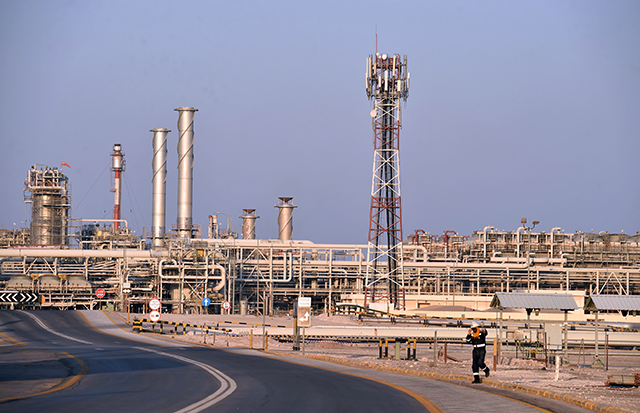You are here
Oil dives to fresh 12-year low under $27
By AFP - Jan 21,2016 - Last updated at Jan 21,2016
LONDON — Oil plunged to fresh 12-year lows under $27 on Wednesday, slammed by gloomy economic forecasts, China's slowdown and abundant crude supplies.
In late afternoon deals, US benchmark West Texas Intermediate (WTI) for February delivery tanked to $26.3 per barrel, a level last seen in early May 2003.
The contract later stood at $26.50, down $1.96 from Tuesday's closing level.
The global oil market has collapsed further since the International Energy Agency (IEA) warned Tuesday that the oil market could "drown in oversupply".
Prices have crashed about 75 per cent since mid-2014, hit by a perfect storm of a stubborn supply glut, the slowing global economy and the rebounding US dollar.
"A stronger dollar continues to present significant headwinds and supply increases show little sign of letting up any time soon," Sucden analyst Kash Kamal said.
"This is very much a supply issue, as global demand has on the whole been quite healthy — but it is likely we will see additional price declines and tighter margins before producers are prompted to cut output," he added.
The strong dollar, meanwhile, makes dollar-priced crude more expensive for buyers using weaker currencies. In turn, that dents demand and prices.
In London, meanwhile, Brent North Sea crude for delivery in March tumbled to $27.11, a low last witnessed in early November 2003.
Brent later stood at $27.34, down $1.42 from the close on Tuesday.
Crude futures are also in freefall with the supply glut set to worsen, as Iran pumps out extra barrels after the lifting of Western sanctions on Tehran.
The IEA predicted Tuesday that prices would fall further this year as supply vastly exceeds demand, with major oil exporter Iran's return to the market offsetting any production cuts from other countries.
Supply glut
The market has been awash with supplies owing to high production levels by the United States and the Organisation of Petroleum Exporting Countries (OPEC), which last year refused to slash output as it looks to maintain market share.
Iran on Monday ordered a boost to crude production a day after the West lifted sanctions on the country in response to Tehran's compliance with a deal on curbing its nuclear programme.
Iran's National Iranian Oil Company said it had ordered an increase in output of 500,000 barrels per day (bpd). The country currently produces 2.8 million bpd and exports just over a million.
"The market is already awash with the stuff and now Iran is adding to the mix, so we may witness even lower oil prices and for longer," predicted analyst Fawad Razaqzada at traders Gain Capital.
Kamal noted that the 12-nation OPEC group has continued to pump above its official output target, adding to the supply glut.
"Prices are forecast to remain under pressure and will likely fall further as crude output from OPEC remained well above its 30 million bpd production quota in December, estimated at 32.89 million bpd," he said.
"The group lacks production discipline and we expect this production glut to persist at the start of 2016," he added. "With Iranian crude set to hit the market imminently, to the tune of 500,000 bpd, we could see the [oil] price come under additional pressure in the short term."
WTI is currently down more than 20 per cent from its value from the start of 2016 after dropping by 30 per cent last year.
Brent is down about 22 per cent from the start of the year, in addition to the almost 35 per cent plunge it suffered in 2015.
IMF: oil price collapse is a drag on global economy
The International Monetary Fund (IMF) said Tuesday that the sharp collapse in the price of oil is proving more of a drag on the global economy than a stimulus.
The financial strains on exporters and the deep investment cutbacks in the industry are more than offsetting the expected gains from cheap oil enjoyed by key importers like Japan and the United States, the IMF added.
Lower crude prices would normally stimulate some demand in countries where it is a key household and business cost, and spur more economic activity, the fund explained in its updated outlook on the world economy.
However, it elaborated, after a 70 per cent fall in prices over 18 months, other factors have dampened the expected gains from that decline.
Firstly, it indicated, "financial strains in many oil exporters reduce their ability to smooth the shock, entailing a sizeable reduction in their domestic demand”.
Secondly, the price fall has forced oil and gas companies to cut back investment, a negative for economic growth.
Moreover, the fund noted that demand for oil had not picked up as the price has plummeted.
It said that factors behind that included, possibly, that cheaper crude prices were not being fully passed on to consumers, and, secondly, that businesses and consumers in some areas might still be reducing spending and debts.
The IMF report was finalised before crude prices fell some 22 per cent in the first two weeks of the year as traders prepared for Iran to return to the international market.
Even so, the IMF forecast included another 17.6 per cent decline in crude prices this year after nearly 50 per cent in 2015, and only a partial rebound in 2017.
Separately, two top US bankers said Wednesday that the oil price collapse is likely to help economies long term, even as markets slump in reaction.
JPMorgan Chief Executive Jamie Dimon said he is still hoping the stock rout of early 2016 that worsened Wednesday will turn out to be only a "speedy adjustment" that does not signal a major global slowdown.
"You've got to separate fluctuations in the market from the economy," Dimon told CNBC in an interview broadcast from the World Economic Forum in Davos, Switzerland.
Lower oil prices benefit some leading economies, such as India and Japan, as well as US consumers, even as they prompt sovereign wealth funds from petroleum-dependent countries to liquidate investments to raise funds, he said.
Dimon's remarks were echoed by Goldman Sachs Chief Financial Officer Harvey Schwartz, who said that the oil slump may not translate into "a real drag on long-term economic activity”.
"It feels like the degree to which the market is focused on the energy exposure has managed to discount the long-term tailwinds to the consumer in a reduction of costs across the globe," he told an analyst conference call.
The comments came as global stock markets registered another bruising session, with leading bourses in Europe and New York off between 2.5 per cent and 4 per cent.
Related Articles
RIYADH — Saudi Arabia said on Monday it will raise its oil exports to a record 10.6 million barrels per day starting from May, escalating a
LONDON — Global oil prices tanked Wednesday to a 6.5-year low as a surprise jump in US crude inventories signalled weak demand in the world'
ABU DHABI — Saudi Energy Minister Khalid Al Falih said on Tuesday he was "very optimistic" about the outlook for the oil market after p

















